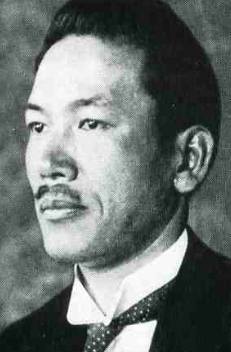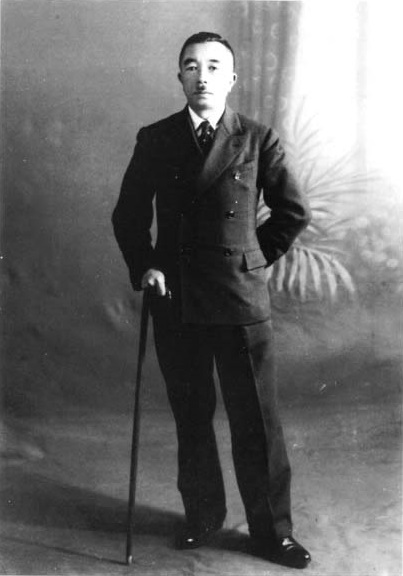<Back to Index>
- Lieutenant General of the Imperial Japanese Army Kiichiro Higuchi, 1888
- Colonel of the Imperial Japanese Army Norihiro Yasue, 1886
PAGE SPONSOR

Kiichirō Higuchi (樋口 季一郎 Higuchi Kiichirō, 20 August 1888 – 11 October 1970) was a lieutenant general in the Imperial Japanese Army in World War II.
Higuchi was born in what is now part of Minamiawaji city on Awaji Island, Hyōgo Prefecture, as the eldest of nine siblings. When he was eleven year old, his parents divorced and he was raised by his mother's family. He was a graduate of the 21st class of the Imperial Japanese Army Academy, and the 30th class of the Army Staff College. As a junior officer, he was sent as military attaché to Poland. Due to his fluency in the Russian language, Higuchi was later posted to Manchuria with the Kwantung Army. Higuchi was a close confidant of General Kanji Ishiwara and Korechika Anami.
From 1933 - 1935, he was commander of the IJA 41st Infantry Regiment, and from 1935 - 1937 served as Chief of staff of the IJA 3rd Division. He was sent to Germany as part of a military delegation in 1937.
As a major general and the commander of the Harbin Special Branch in 1938, he allowed some Jewish refugees who had fled Nazi Germany to cross the border from the Soviet Union to Manchukuo. A few of his subordinates were responsible for feeding the refugees, settling them in Harbin or Shanghai, or arranging for exit visas.
Recalled to Japan in late 1938, Higuchi served briefly on the Imperial Japanese Army General Staff before being assigned as commanding officer of the IJA 9th Division in 1939. In 1942, he was promoted to lieutenant general and assigned to the Sapporo - based Japanese Fifth Area Army. He participated in the invasion of the Aleutian islands, including the disastrous campaigns on Attu Island and Kiska Island. Afterwards, as commander of the Northern District Army he organized the defenses of northern Japan against invasion by Allied forces, fortifying Shumshu island in the northern Kurile Islands chain, and Karafuto.
In December 2009, the Israeli ambassador to Japan presented the park commemorating Higuchi's act with an olive sapling.

Colonel Norihiro Yasue (安江仙弘, Yasue Norihiro; 1886 – 1950) was an Imperial Japanese Army officer who played a crucial role in the so-called Fugu Plan, in which Jews were rescued from Europe and brought to Japanese occupied territories during World War II. Believing strongly in the Protocols of the Elders of Zion, he was known as one of the "Jewish experts", along with Capt. Koreshige Inuzuka.
At the age of 33, Captain Yasue was assigned to Siberia, to aid the Russian White Army in their struggle against the Communist Red Army. A Russian language specialist, he was assigned to the staff of General Gregorii Semenov, a vehement anti - Semite who distributed copies of the Protocols to all of his troops, along with weapons, rations and the like. Along with a few dozen other Japanese soldiers, Yasue read and accepted the premises of the Protocols, and would allow this to guide much of his actions and views into the time of the beginning of World War II.
Beginning upon his return to Japan in 1922, Yasue sought to educate the Japanese people as to the dangers of the Jewish conspiracy outlined in the Protocols, and to influence his government to take action. Working in the Army Intelligence Bureau, he began work on a Japanese translation of the document, while continuing to speak with Inuzuka and a handful of others about the perceived problem. Their group grew quickly, publishing articles in internal army journals, and holding informal lectures and discussion groups. Following the publishing of his translation of the Protocols, Yasue attracted the attention of the Ministry of Foreign Affairs (外務省, Gaimushō), and was sent in 1926 to Palestine to research the Jewish people. There, he traveled much of the country, and spoke to a variety of people, including popular Jewish leaders such as Chaim Weizmann and David Ben - Gurion, farmers, shopkeepers, and rabbis. He became particularly interested in the emerging kibbutz movement, which he came to believe would be used by the Jews in their colonization of the world; his report to the Ministry, however, revealed that no one he spoke to mentioned anything about a conspiracy.
As war approached in the 1930s, Yasue's influence, and that of his comrades, deepened, particularly among those who were distraught by the lack of respect Japan received on the world stage, and who were wary of the cultural changes that accompanied "progress." It was at this time that Yasue and his "Jewish experts" met the so-called "Manchurian faction," a number of industrialists and military officers who saw Manchuria as crucial to Japan's success. Gisuke Ayukawa in particular was interested in Yasue's ideas, and suggested to him that of using Jews to help develop Manchukuo (Japanese occupied Manchuria). Through this partnership, and later discussions, the idea for the "Fugu Plan" was born and developed.
The plan hit a major obstacle almost immediately after it was conceived; two years after the Mukden Incident which spurred the Japanese invasion of Manchuria, a young Jewish man named Simon Kaspe was kidnapped, tortured and murdered. Jews fled the Manchurian city of Harbin by the thousands; Yasue was placed officially in charge of stemming and reversing this exodus. To that end, he sought out Dr. Abraham Kaufman, a prominent and respected figure among those Jews remaining in Manchuria. Gradually and carefully earning the respect and friendship of Dr. Kaufman, he helped the doctor form the Far Eastern Jewish Council in 1937, an official body representing the views of the Manchurian Jewish community. Yasue, now promoted to colonel, was assigned to the city of Dairen (now called Dalian), but continued to commute to Harbin to speak with Kaufman and for other meetings and activities related to his plans regarding the Jewish communities.
The Five Ministers' Conference in 1938 provided the formal go-ahead for Yasue and his colleagues to begin setting up a Jewish settlement in Shanghai.
In 1939, Yasue, along with Capt. Inuzuka and Shiro Ishiguro of the Ministry of Foreign Affairs, recommended that Japan set up an autonomous Jewish region near Shanghai; by providing a safe place for Jews to live, and granting them the autonomy to live as they desired, the three men hoped to attract more Jews to favor Japan. The three began meeting on a regular basis, either at the Shanghai Consulate, or on board the Japanese cruiser Izumo anchored in the harbor, just off the Bund. Yasue continued his activities in Harbin at this time, organizing a third Far Eastern Jewish community conference, becoming associated with the president of the South Manchurian Railway, Yosuke Matsuoka, and Setsuzo Kotsuji, the only Japanese in the world at the time to speak and read Hebrew. Yasue also arranged for Abraham Kaufman to be invited to Tokyo on a formal visit.
Over the next few years, Yasue was central to the operations of nearly every aspect of the Fugu Plan. Along with Inuzuka and a handful of others he coordinated everything from choosing and setting up sites for settlements, transporting Jews to the settlements, speaking with Jewish community leaders to gain economic and moral support, and working of course within the bounds granted him by the Japanese government and military. He organized missions to Jewish communities in the United States, and considered the Manchurian Jewish community he wished to create an "Israel in Asia." Suggesting that the organized, localized community they were creating be placed in Manchuria, rather than in Shanghai or other locations preferred by some of his other comrades, Yasue also advocated that the community, while strictly designated geographically, be as autonomous as possible. The most idealistic of the group, according to Marvin Tokayer, Yasue was the most interested in the comfort and benefit of the Jews living there; he likely also believed that restrictions on the community would hamper the Jews' abilities to have the maximum positive influence on Japan's power, and could endanger the benevolent views of the Jewish community towards Japan. Against his wishes, the commander of the Middle China Expeditionary Army ordered that the community be closely supervised and guided, while being made to appear autonomous.
Yasue was summarily dismissed from his post, and from the army, in 1940, as a result of the signing of the Tripartite Pact which formally sealed Japan's alliance with Nazi Germany. Though he remained a representative for the government, and continued to be active to a degree in the execution of the Plan, he could not formally retain his post as an overt member of a pro - Jewish faction. He immediately flew to Tokyo to urge the government to not allow foreign countries, i.e. Germany, to dictate Japanese policy. Offered reinstatement, he refused. Interestingly, though Yasue was originally quite anti - Semitic, Tokayer alleges that he truly became pro - Jewish around this point. Though he had contributed for a time to various publications on the Jewish situation, including Kokusai Himitsu Ryoku no Kenkyu (国際秘密力の研究, Studies in the International Conspiracy), under the pen name Hokoshi, he ceased participating in such activities upon his dismissal.
By 1942, the Plan fell apart. Japanese aid for Jews would not be tolerated by Japan's ally, Nazi Germany, and Japanese attempts to shuttle Jews through Russia were halted when Russia became an enemy of Germany and Japan. That same year, Gestapo chief Josef Meisinger was sent to Shanghai and began preparations to exterminate the population of the Jewish community there, which was created in accordance with the Plan of Yasue and his comrades. This never came to fruition, as the community appealed to Yasue and others who revealed Meisinger's intentions to the government in Tokyo and saw it prevented entirely.
An advisor to the government of Manchukuo during the war, based in Dairen, Yasue became less and less involved in the Fugu Plan in any official capacity. He did, however, maintain contacts, and some involvement with the community in Shanghai which was formed as a result of his actions. When the Soviet Union invaded Manchukuo in August 1945, just prior to the surrender of Japan and the end of the war, Yasue did not attempt to flee the mainland. He arranged a formal farewell to his family, in which he expressed his view that his entire generation was to blame for the war, and its outcome. He did not feel it would be honorable to flee from his responsibility, and so he allowed himself to be captured by the Soviet forces.
Yasue died in 1950, in a labor camp in Khabarovsk.
Following the ideas set out in the Protocols, Yasue came to believe in a worldwide Jewish conspiracy, and in the innate economic and political power of the Jewish people. Thus, he agreed with Inuzuka and others in the idea of turning the attitude of the global Jewish community to Japan's favor, believing that they could thus reap incredible economic and political gains for their country.
He saw the influence of Karl Marx and Jacob Schiff as powerful supporting examples for this ideology. Marx's ideas inspired the Bolshevik uprising, and thus altered the course of Russian history dramatically; Schiff, an American banker, contributed financially heavily to the Japanese government, allowing them to win the Russo - Japanese War a decade or so earlier.
By 1940 or so, however, he had developed close relationships with a number of Jews, and with the Shanghai Jewish community in general, and became one of their strongest advocates. Though he may or may not have continued to believe in the racial and cultural ideas expressed in the Protocols, he also felt quite strongly for the happiness and safety of the Jewish people who lived in the Japanese Empire.